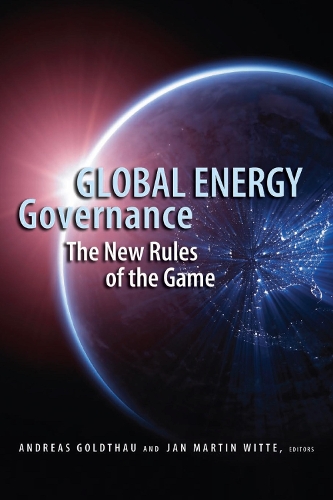
Global Energy Governance: The New Rules of the Game
(Paperback)
Publishing Details
Global Energy Governance: The New Rules of the Game
By (Author) Andreas Goldthau
Edited by Jan Martin Witte
Bloomsbury Publishing PLC
Brookings Institution
11th January 2010
United States
Classifications
Professional and Scholarly
Non Fiction
338.2728
Physical Properties
Paperback
386
Width 152mm, Height 229mm, Spine 23mm
535g
Description
The authors bring together decisionmakers from industry, government, and civil society in order to address two central questions: What are the current practices of existing institutions governing global oil and gas on financial markets How do these institutions need to adapt in order to meet the challenges of the twenty-first century The resulting governance-oriented analysis also provides the basis for policy recommendations to improve global regulation.
Reviews
"We have entered an era where the provision of clean, affordable, and secure
energy to more of mankind is more than just urgent. It is also increasingly
complicated, crossing a multitude of political and institutional fault lines. This
volume offers an extensive and insightful analysis of the rules and institutional
mechanisms that structure global energy markets, and it provides practical
recommendations for policymakers to reshape the global energy governance
landscape to foster energy security in the twenty-first century." William C. Ramsay, director for energy at the Institut Franais des Relations
Internationales (ifri) and former deputy executive director of the International Energy Agency
"This is a far-ranging and sober look at the challenges facing the world energy
system. Unlike many studies, which look at only one corner such as oil or gas or
global warming these authors take on all the challenges. And they are politically
astute in offering recommendations for policy reforms that will work. Their focus
on the need for new international institutions is particularly welcome." David G. Victor, director of the Laboratory on International Law and Regulation,
University of California, San Diego
"Goldthau and Witte have brought together some of the world's finest thinkers on
the geopolitical issues surrounding the energy resource strategies being pursued
by the world's most powerful nations. By viewing multiple dimensions of energy
policy through the lens of institutional structures for market regulation and administration, the authors illuminate the key technological, political, and economic
components of the global energy and financial markets. Their analysis ends with
a thoughtful set of recommendations for pushing out the boundaries of global
energy governance." Adam E. Sieminski, chief energy economist at Deutsche Bank
Author Bio
Andreas Goldthau is associate professor of public policy at Central European University, Hungary, and head of the Energy Security Program at its Center for Environment and Security. He is also a fellow at the Global Public Policy Institute (GPPi), Berlin.Jan Martin Witte is associate director of GPPi.
